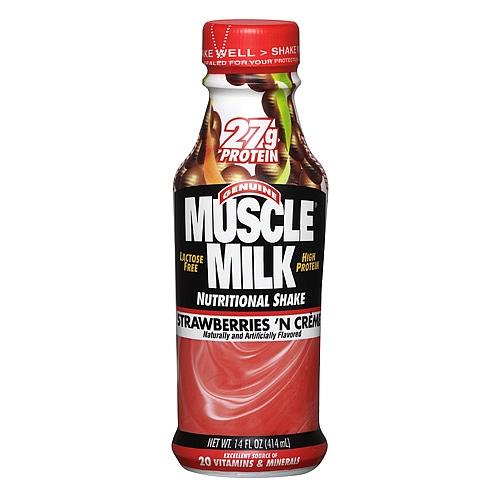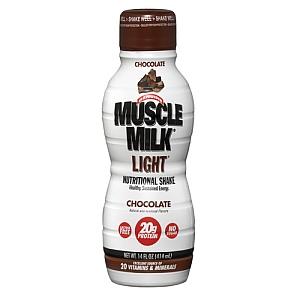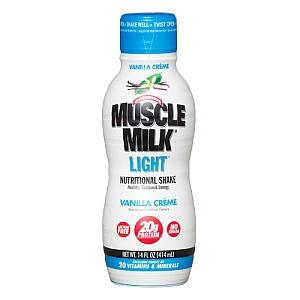By Colleen Alexander, Nutrition Student, Sargent College
Muscle Milk has recently joined a sea of protein supplements that are advertised for all ages and ailments. To appeal to a widening demographic, Muscle Milk’s collection now includes chocolate malt, banana and strawberry flavors, and a new series of reduced fat “Muscle Milk Light” options. Marketers tell us that for only $4.19 for a 14 ounce serving, we can revive our mind, sustain energy, suppress appetite, manage weight and spur lean muscle growth. But does Muscle Milk deliver on these claims? I recently had the pleasure of sitting down with Professor Stacey Zawacki’s Food, Dietary Supplements, and Consumer Health class to discuss the merits of Muscle Milk.
Muscle Milk is considered a dietary supplement. The FDA does not ensure the safety of dietary supplements or the accuracy of manufacturer claims before they go on the market. Some supplement manufacturers seek independent testing to ensure consumers that their products contain the quantity of ingredients declared on the label and do not contain undeclared ingredients or unacceptable levels of contaminants.
Despite headlines in the past year following a test by Consumer Reports that found elevated levels of heavy metals (cadmium, lead, arsenic, and mercury) in a sample, Muscle Milk is certified by an independent organization called NSF. Muscle Milk has also earned the NSF “Certified for Sport” designation, indicating that the product does not contain any substances banned for use in athletics. This is important because such substances have been intentionally added to dietary supplements aimed towards athletes or may be introduced unintentionally due to poor manufacturing practices.
Muscle Milk is a formula containing protein, carbohydrates, fat, vitamins and minerals. Contrary to the name, the label states that it “contains no milk.” The protein in Muscle Milk has been isolated from cow’s milk; the difference is the amount in each drink. A 14-ounce serving of muscle milk contains 25 grams of protein, while the same amount of milk contains 14 grams. Muscle Milk fuels a growing concern that consumers are not receiving enough protein each day, while in reality Americans consume more than enough to build muscle and meet all the other needs of the body. Unfortunately, any excess is not always rerouted to our biceps. Protein contributes to muscle growth if consumed during the small window of time following exercise when muscles have an increased ability to absorb and use protein. This means that drinking Muscle Milk while studying isn’t going to increase the size of our muscles.
Recent studies have compared cow’s milk to commercial alternatives in their efficacy as post-exercise recovery aids. Both milk and chocolate milk offer an effective natural balance of protein, carbohydrates and nutrients at a fraction of the cost of Muscle Milk.
Muscle Milk contains a formula of 20 vitamins and minerals. At first glance, this is impressive; but an ounce for ounce comparison of the many nutrients found in milk reveals that Muscle Milk is not a superior source. Most people will not benefit from the vita-boost of other nutrients because adequate amounts of those vitamins and minerals are obtained through a varied diet. Amounts in excess of recommendations of the US Dietary Reference Intakes do not offer additional benefits, and can potentially have harmful side effects.
In particular, Muscle Milk contains high levels of chromium, an element suggested to aid weight loss and improve athletic performance. A review of scientific literature found inconclusive evidence to confirm that chromium assists in either of these claims. A single serving of Muscle Milk contains 60% of an individual’s daily chromium needs. A second serving of Muscle Milk would put someone over recommended levels. A better strategy is to look to nutrient-packed food sources of chromium such as whole grains and nuts.
In conclusion, the average consumer will not benefit from the high levels of protein and vitamins that Muscle Milk contains. However, for athletes with high caloric needs or people struggling to gain weight, Muscle Milk offers a dense source of nutrients. If this is the case for you, the benefits of Muscle Milk can be maximized (and the effect on your pocketbook minimized) if it is consumed as part of a balanced diet and intake is limited to one serving per day.
Have you tried Muscle Milk?
 Photo Source
Photo Source

10 Comments
Heather posted on May 6, 2011 at 2:05 pm
Love this article! Such great points made! Great work, Colleen.
Alison posted on July 4, 2012 at 1:49 pm
This can be an excellent supplement for those who work out. Good review.
John Keeler posted on July 18, 2013 at 5:06 pm
I’m thinking one serving every other day post workout shouldn’t be a problem…
Mary posted on February 27, 2014 at 6:23 pm
Awesome post.
Tabelacı posted on December 7, 2022 at 7:04 pm
milkk good
Mixing tank posted on April 3, 2023 at 1:25 am
I’m so proud of you! You’ve come so far and accomplished so much.
Mujaniii posted on May 30, 2023 at 1:45 pm
Thank you for the valuable information and insights. reddit
ankara disleksi posted on September 16, 2023 at 5:09 am
thank you for this postAnkara Disleksi
ankara disleksi posted on September 16, 2023 at 5:13 am
güzel bir yazı olmuşAnkara Disleksi
ankara travesti posted on October 17, 2023 at 7:02 am
good post very likeAnkara Travesti
One Trackback
[…] http://blogs.bu.edu/sargentchoice/2011/05/06/muscle-milk/ […]